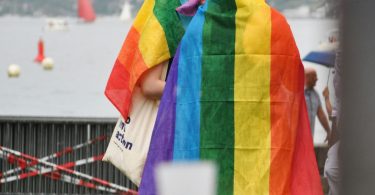WASHINGTON – In marking the annual Transgender Day of Remembrance, the Human Rights Campaign released its 2023 annual report documenting the epidemic of violence taking the lives of trans and gender non-conforming people.
According to HRC’s report, at least 33 transgender and gender-nonconforming people were killed in the last 12 months, an overwhelming majority who were young people of color, with Black transgender women disproportionately impacted.
“In the 12 months since Transgender Day of Remembrance 2022 (November 20, 2022), we’ve reported on at least 33 transgender and gender non-conforming people killed in an epidemic of violence threatening our community. These victims had families and friends, hopes and dreams. None of them deserved to have their lives stolen by horrific violence,” said Tori Cooper, Director of Community Engagement for the Transgender Justice Initiative, Human Rights Campaign Foundation.
“Almost two-thirds of the victims were Black trans women, a tragedy that reflects an appalling trend of violence fueled by racism, toxic masculinity, misogyny and transphobia and the politicization of our lives. We need everyone to join us in empowering transgender leaders, building safer, stronger communities and reducing stigma. We cannot rest until all transgender and gender non-conforming people can live our lives safely as our full selves,” she added.
“The epidemic of violence against transgender and gender-nonconforming people is a national tragedy and a national embarrassment,” HRC President Kelly Robinson said Monday in a statement. “Each of the lives taken is the result of a society that demeans and devalues anyone who dares challenge the gender binary.”
The report also noted that the actual tally of deaths may be much higher because “data collection is often incomplete or unreliable when it comes to violent and fatal crimes against trans and gender-nonconforming people.”
The Federal Bureau of Investigation (FBI) recorded just 21 fatal hate crimes committed against transgender and gender-nonconforming people over the same time period.
This report comes amidst a tidal wave of anti-transgender legislation. In 2023, for the first time in its 40+ year history, the Human Rights Campaign declared a National State of Emergency for LGBTQ+ Americans, in response to the over 550 anti-LGBTQ+ bills introduced into state houses across the country, more than 80 of which were passed into law.
This is a record high for anti-LGBTQ+ legislation introduced and enacted in a single state legislative session since HRC began tracking—beating out 2022, which, with 25 anti-LGBTQ+ bills enacted, previously held the record for most anti-LGBTQ+ bills enacted in a single year.
The report noted that the vast majority of the bills introduced in 2023— over 220—specifically targeted transgender people in an attempt to: limit access to school sports, school restrooms and locker rooms; ban access to safe, effective, age-appropriate gender-affirming medical care; and remove inclusive books and references to LGBTQ+ identities and experiences from school curricula (a la “don’t Say LGBTQ”). Coordinated efforts led by well-funded right-wing extremist organizations such as the Family Research Council, Heritage Action, and the Alliance Defending Freedom have led to similar efforts in the U.S. House of Representatives, including attempts to pass nationwide trans sports bans and bans on gender affirming care, as well as attempting to enact anti-LGBTQ+ legislation through attaching extraneous riders to appropriation bills.
Against this backdrop of discriminatory legislation, attacks on the transgender and gender non-conforming community, as well as the LGBTQ+ community and its allies writ large, are on the rise. Proponents of anti-trans legislation in state houses and Congress, have often relied on hate-filled rhetoric that demonizes transgender people and their allies, perpetuates misinformation, and legitimizes anti-trans stigma, violence, and hate.
Such rhetoric has, unfortunately, begun to translate to real world violence: 2022 saw the highest number of anti-LGB and anti-trans and gender non-conforming hate crimes reported by the FBI to date, with the number of hate crimes based on gender identity increasing by over 32% from 2021 to 2022.
Almost 500 gender identity-motivated hate crimes were recorded in 2022, accounting for 4% of all hate crimes recorded in that year; anti-LGBTQ+ hate crimes overall accounted for more than one in five (20.8%) hate crimes. And this number is an undercount, given that FBI data reporting does not capture all hate crimes, as not all jurisdictions track anti-trans hate crimes, nor do all jurisdictions report hate crimes to FBI databases.
In addition to the FBI-reported hate crime incidents , between the beginning of 2022 and late April 2023 GLAAD recorded 161 different attacks against drag events, including bomb threats, vandalization, armed and violent protests, and in one instance the firebombing of venues that hosted Drag Story Hour and other all-age drag events.
These attacks were part of the more than 350 anti-LGBTQ+ incidents across 46 states, recorded by GLAAD and the ADL over the same period. June 2023 saw 145 additional anti-LGBTQ+ extremism incidents recorded at Pride events across the country. Transphobic violence and hate has even taken the lives of several cisgender allies this year, such as in the case of Colin Michael Smith, a White cisgender man in Oregon who was stabbed and killed while defending a non-binary friend from an assailant “hurling anti-LGBTQ+ slurs,” and Laura Ann Carlton, a White cisgender woman in California, who was shot and killed for refusing to stop flying a pride flag over her store.
These attacks are occurring against a community which is already vulnerable and marginalized. As detailed in HRC’s report “Dismantling a Culture of Violence,” transgender and gender non-conforming people face multiple forms of sigma, which result in lower access to status, power, and resources, and higher risk of discrimination, including in employment, healthcare, and housing. Together, this contributes to higher risk of poverty and homelessness/housing insecurity, social isolation, and worse physical and mental health outcomes, which in turn results in increased risk for violence.
Such stigma, bias and discrimination compounds for transgender and gender non-conforming people who hold multiple marginalized identities. Transgender women and transgender people of color are at elevated risk of fatal violence, and the risk is compounded for Black transgender women, who comprise the vast majority of victims of fatal violence against trans and gender non-conforming people.
“We must imagine a better future for transgender and gender-nonconforming people,” Robinson said Monday. “Not just surviving, but truly living as free and equal members of our society.”







